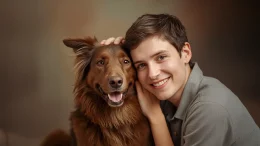
- Home
- Dog Behaviour
- Why Dogs Hide Illness or Injury – And How to Spot the Signs
Why Dogs Hide Illness or Injury – And How to Spot the Signs

Dogs are incredibly resilient animals, but they are also experts at hiding pain, illness, or injury. Unlike humans, who will often let everyone know when they are unwell, dogs tend to mask discomfort until it becomes serious. This natural instinct can make it difficult for owners to recognise when something is wrong.
So why do dogs hide signs of illness, and how can you pick up on the subtle cues before a minor issue turns into a bigger problem?
Why Do Dogs Mask Pain?
Dogs instinctively hide pain due to their evolutionary background.
- Survival Instincts – In the wild, showing weakness made dogs and their ancestors vulnerable to predators. Hiding pain was a necessary survival mechanism. Even though pet dogs now live safely in homes, this instinct remains.
- Pack Mentality – Dogs are social animals that form strong bonds with their families. In a pack setting, showing signs of illness or injury could lead to a loss of status, making them more vulnerable.
- Pain Response Differences – Research suggests that dogs experience pain differently than humans. While they do feel discomfort, their reaction may not be as obvious. Their body language is often subtle, meaning symptoms can go unnoticed without close observation.
- Breed Differences – Some breeds, particularly working dogs like Border Collies, Kelpies, Labradors, and Greyhounds, are naturally more resilient and may tolerate significant discomfort before showing any clear signs.
Signs That Your Dog May Be in Pain or Unwell
Because dogs rarely make it obvious when they are feeling unwell, it is important to look for small behavioural and physical changes.
- A normally energetic or playful dog becoming withdrawn, clingy, or unusually irritable.
- Sudden changes in appetite, such as refusing meals or eating much slower than usual.
- Drinking more or less water than usual.
- Excessive panting or struggling to settle down.
- Limping, stiffness, or a reluctance to move, jump, or climb stairs.
- Changes in posture, such as a hunched back or reluctance to lie down.
- Constant licking, chewing, or nibbling at a particular area, even if there is no visible wound.
- Squinting, ears pinned back, frequent lip licking, or other subtle changes in facial expressions.
- Increased whining, whimpering, yelping, or groaning when touched or moving.
- Restlessness, difficulty getting comfortable, or excessive sleeping.
- Shallow breathing, excessive panting, or heavy sighing.
When to Contact a Veterinarian
Some signs require immediate veterinary attention, while others may warrant monitoring over time.
Seek immediate veterinary care if your dog experiences:
- Sudden, severe pain or yelping.
- Difficulty breathing, excessive panting, or wheezing.
- Vomiting or diarrhoea that lasts more than 24 hours.
- Visible swelling, bleeding, or an open wound.
- Sudden loss of balance, disorientation, or seizures.
- A bloated stomach, particularly in deep-chested breeds.
Monitor closely and consult a vet if symptoms persist or worsen:
- Gradual weight loss or a reduced appetite.
- Mild limping or stiffness that does not improve.
- Persistent licking or chewing of one area.
- Ongoing behavioural changes such as increased anxiety, aggression, or lethargy.
- A persistent cough or sneezing.
Understanding the Role of Training vs Veterinary Care
At Jordan Dog Training, our focus is on helping dogs thrive through training, socialisation, and behaviour support. While we can help you understand your dog’s body language and emotional needs, medical concerns should always be addressed by a qualified veterinarian.
Early Detection Can Make a Difference
Dogs rely on us to notice when something is not right. By paying attention to their subtle cues and acting early, you can help prevent minor issues from becoming serious health problems.
Have you ever had a situation where your dog masked pain or illness? Share your experience in the comments.
Disclaimer
This post is intended as a conversation starter and to raise awareness. It is not veterinary advice. If you have any concerns about your pet’s health, please consult your veterinarian for professional guidance.

Justin Jordan
Master Trainer
- In-home behaviour modification consultations
- Puppy schools
- Obedience classes
- Specialist training
- Media enquiries
- Trainer opportunities
- Supplier enquiries
- Guest appearances
















